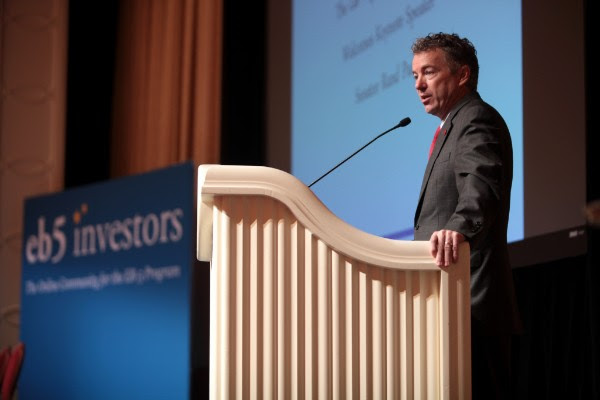Less than a year after Senator Rand Paul gave a keynote address at the 2015 Las Vegas EB-5 Conference, he delivers on his promise to “make the program bigger and even better,” and introduces legislation that will expand and make permanent the EB-5 program. Read our response to the new EB-5 legislation now!

In the latest EB-5-related bill to hit the Senate floor, Senator Rand Paul introduced the most open-handed, favorable legislation to-date for the reauthorization and renewal of the EB-5 Regional Center Program.
The Invest In Our Communities Act, Bill S. 2122, comes at a critical time for an industry that brings billions of dollars and tens of thousands of jobs to American businesses and workers. Senator Paul’s bill proposes permanently protecting and bolstering the economic stimulation and job creation power for local and state economies across America.
The bill is unsurprising coming from Senator Paul, whose Kentucky candor and libertarian disregard for party lines often separate him from the mêlée. His approach to the EB-5 program, as laid out in S. 2122, is no different. Austrian economic principles guide the approach to bill S. 2122, offering simple solutions to root issues that, if passed, would resolve many of the hotly-contested topics that have plagued past proposed legislation.
Namely, S.2122 would strengthen the EB-5 program in five key areas:
- Making the program permanent
- Raising the total number of visas available under the EB-5 category
- Removing derivatives, meaning that visas for an investor’s spouse and children will not count towards the total number of allotted EB-5 visas
- Introducing transparency measures
- Keeping the TEA investment amount at $500,000
By expanding the number of visas, bill S. 2122 could ease controversies over where EB-5 dollars and jobs go. The issue, which divides legislators and industry stakeholders alike, stems from a conflict between rural and urban interests. Instead of entering the argument about how many visas get allotted where, bill S. 2122 cuts to the true issue: insufficient visas to fulfill demand in both urban and rural areas.
The demand is certainly there. According to a recent calculation, approximately 15,000 visa petitions are backlogged. American businesses and American workers are increasingly leveraging EB-5 funds for many reasons. The money is there, the investors are there, and only visa limits are keeping the jobs from coming. S. 2122’s visa proposal could fix that for communities across America.
Likewise, removing derivatives sets bill S. 2122 apart from the previous Senate Bill from Leahy and Grassley. Senator Paul’s bill not only frees up more visas for investors to contribute to the economy, but also eases up on bureaucracy.
Past bills delve into complex solutions to parse out fair distribution of a certain number of visas to one or the other. Instead of burdening the program – and taxpayers – with more bureaucratic regulation, bill S. 2122 lets the free market decide. Bill S. 2122 is the 5th to-date, and along with S.1501 is the second bill introduced this year to the Senate.
Source: eb5 investor magazine










